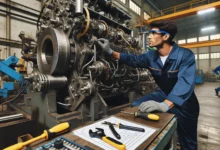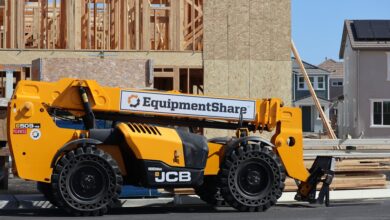Industrial Machinery Auctions: How to Buy Quality Equipment at Lower Prices and Avoid Pitfalls
Advertisement
When I think about the world of industrial machinery, I see a landscape that’s constantly evolving. Businesses are always looking for ways to upgrade their equipment without breaking the bank. That’s where industrial machinery auctions come in—they offer a unique chance to snag high-quality machines at a fraction of the original cost.
I’ve noticed that these auctions attract everyone from small business owners to large manufacturers. There’s a sense of excitement as bidders compete for the best deals. Whether you’re expanding your operations or just starting out, understanding how these auctions work can open doors to incredible opportunities.
Understanding Industrial Machinery Auctions
Industrial machinery auctions operate through a series of structured steps that make it easy for me and other buyers to participate and secure the equipment we need. Knowing the standard process helps me set realistic expectations and make informed decisions.
- Registering for the Auction
Registering is the first step, and I always provide basic business information and agree to auction terms. Many platforms now let me register online, which streamlines access to both in-person and virtual auctions.
- Reviewing Auction Listings
Browsing auction listings lets me examine available machinery like CNC lathes, forklifts, and presses. I check equipment specifications, photos, inspection reports, and sometimes videos to ensure transparency before bidding.
- Inspecting Equipment
Arranging onsite or virtual inspections helps me evaluate an asset’s condition. Most reputable auctions have preview days so I can spot wear, maintenance history, or any unseen issues that aren’t obvious in photos.
- Placing Bids
Placing a bid is as simple as clicking a button online or raising a paddle at a physical event. Bidding increments and closing timeframes are clearly stated, and I monitor alerts or notifications as the auction progresses.
- Winning Lots and Payment
Winning a lot obligates me to complete payment, typically within a few business days. Payment options vary, but most auctions accept wire transfers, bank drafts, or business checks.
- Coordinating Pickup or Delivery
Arranging removal means I coordinate with logistics or auction staff to schedule pickup or shipping. It’s crucial to follow deadlines—auctions often set firm removal periods to free up storage.
These steps provide a predictable, transparent pathway from initial interest to final acquisition, allowing me to secure industrial equipment with clarity and confidence.
Exploring Different Types Of Industrial Machinery Auctions

I see industrial machinery auctions come in several formats, each offering unique advantages to buyers and sellers. Let me walk through the key types you’re likely to encounter when searching for the right machinery.
Online Industrial Machinery Auctions
I rely on online industrial machinery auctions for their convenience. These digital platforms—such as BidSpotter, EquipNet, and Go-Dove—let me browse equipment listings, review machine specs, and place bids from anywhere. I often find a wider range of CNC machines, forklifts, and production line equipment than I’d see at local events. Most online auctions run for several days, so I have extra time to do research, compare models, and coordinate financing.
Live In-Person Machinery Auctions
I get a unique energy at live in-person machinery auctions. Attending events at industrial sites or auction houses lets me inspect equipment like presses, lathes, and conveyors in real time. I interact with expert staff, ask technical questions, and assess machine condition firsthand. Fast-paced bidding sometimes drives prices up, but I also spot bargains unavailable online. I recommend this format if hands-on inspection is critical to your purchasing decision.
Timed And Sealed Bid Auctions
I find timed and sealed bid auctions offer more privacy and less pressure than traditional live bidding. In a timed auction, I submit my highest bid during a set period—often 24 to 72 hours—without seeing competitors’ offers. Sealed bid auctions require me to submit a confidential bid by a deadline, and the highest bid wins after opening. Industrial equipment like injection molders or compressors often appears here, with this process suiting buyers seeking a fair and discreet way to secure machinery.
Preparing For Industrial Machinery Auctions
I always make sure I’m fully prepared before stepping into any industrial machinery auction. Solid preparation boosts my confidence and ensures I make smart buying decisions.
Researching Auction Listings And Catalogs
I check all current auction listings and catalogs in detail. I review item descriptions, model numbers, maintenance records, and included accessories for each machine. I use auction house websites, digital catalogs, and even email alerts to compare machinery specs and track high-value lots. I focus on brands, production years, and service history to filter out under-maintained equipment.
Inspecting Machinery Before Bidding
I schedule in-person or virtual inspections whenever possible. I check for visible wear, missing components, and recent repairs during these viewings. I ask auction staff about operating hours, equipment history, and any available inspection reports. I bring along a technician or use third-party evaluators for complex machines like CNC tools, forklifts, or injection molders to avoid unexpected repair costs.
Understanding Auction Terms And Conditions
I always read the auction’s terms and conditions before placing bids. I review buyer’s premiums, payment deadlines, accepted payment methods, and removal timelines. I clarify warranty or “as-is” clauses by contacting auction support, especially when dealing with large investments. I confirm return policies and dispute procedures for any significantly misrepresented items to avoid costly surprises.
Bidding Strategies For Industrial Machinery Auctions
I know winning the right equipment at industrial machinery auctions means using smart, decisive bidding strategies. I always stay focused on my goals, the condition of each lot, and my financial limits before diving in.
Setting A Budget And Sticking To It
I always set a strict budget before bidding on industrial machines like CNC lathes, forklifts, or milling equipment. I factor in the maximum bid amount, buyer’s premium, taxes, and transport costs when planning. I don’t let auction excitement push me past my limit—even when close competition drives up prices.
Participating In Competitive Bidding
I watch other bidders closely to spot patterns or hesitation during bidding on popular machinery like presses or conveyors. I wait until the bidding slows before making my move, helping me avoid bidding wars. I stay disciplined, not chasing after lots that quickly exceed my pre-set value projection.
Leveraging Proxy Bidding Tools
I take advantage of proxy bidding features on major auction platforms, especially for sought-after equipment like laser cutters or heavy-duty compressors. I pre-set my highest acceptable bid, letting the system auto-bid on my behalf up to that limit. I use proxy bidding to avoid emotional decisions and to participate when I can’t watch the auction live.
Assessing The Benefits Of Industrial Machinery Auctions
Industrial machinery auctions unlock several significant advantages for buyers and sellers. I see three distinct benefits driving their ongoing popularity in today’s equipment market.
Access To High-Quality Equipment At Lower Costs
I consistently find that auctions offer access to well-maintained, high-grade industrial equipment at prices well below retail. Major manufacturers, construction firms, and liquidators supply surplus or gently used machines—like CNC mills or forklifts—meaning I can source premium gear without breaking my budget. Savings of 20–60% off new-equipment pricing are common, according to Ritchie Bros and Industrial Auction Hub.
Wide Variety Of Machinery Options
I’ve noticed industrial machinery auctions routinely feature a broader selection than dealerships or classifieds. Auctions gather everything from metalworking lathes and woodworking saws to food processing lines and robotic arms. This variety lets me compare brands, specs, and conditions all in one place, saving time and expanding my potential for the right fit.
Opportunities For Networking And Industry Insights
I use live and online auctions not just to buy, but to network. These events attract business owners, operators, auctioneers, and equipment appraisers. I gain inside knowledge on market trends, upcoming liquidation sales, and global pricing by connecting with others. This industry exposure often leads me to new suppliers and business partners, giving me a competitive edge for future acquisitions.
Avoiding Common Pitfalls At Industrial Machinery Auctions
I see many eager buyers stumble into avoidable mistakes at industrial machinery auctions. Careful attention to auction details helps me avoid costly surprises and secure better equipment for my business.
Beware Of Hidden Fees And Buyer’s Premiums
I always check for hidden fees, especially buyer’s premiums—these are charges that auction houses add on top of each winning bid. Some auctions list buyer’s premiums of 5% to 20%, which can raise my total cost substantially. I read the terms and verify whether extra charges like administrative fees, removal costs, or taxes apply. Many buyers overlook these add-ons and end up paying more than they budgeted. Before bidding, I calculate the full price including all these fees so I know my real maximum.
Evaluating Equipment Warranties And As-Is Sales
I pay close attention to the warranty status and sale terms of each machine because most items at industrial machinery auctions sell “as-is, where-is.” This means I take on all the risk, and no refund or repair is guaranteed after the sale. Sometimes, auctioneers highlight lots with remaining manufacturer warranty; I prioritize these when available to reduce my risk. If all sales are as-is, I arrange a thorough inspection, review equipment records, and communicate with the auction house about any uncertainties before I commit. This helps me avoid getting stuck with faulty or non-compliant equipment.
Finalizing Purchases And Arranging Logistics
Once I secure a winning bid at an industrial machinery auction, I need to move quickly to finalize my purchase and coordinate logistics. Every auction house operates on strict timelines for payments and equipment removal, so being proactive ensures a smooth post-auction experience.
Completing Payment And Official Paperwork
I always review my invoice immediately after the auction closes to check for buyer’s premiums, taxes, and any additional documentation fees. Most auction houses only accept wire transfers or certified checks, and payment deadlines typically range from 24 to 72 hours after the sale. I make sure to obtain official receipts and keep copies of all purchase agreements for my records. If the auction requires a notarized bill of sale or transfer documents, I complete and submit them within the specified window to avoid delays in taking ownership of my equipment.
Coordinating Machinery Removal And Transportation
I coordinate with the auction site to schedule equipment removal within the allowed timeframe, which often ranges from a few business days to two weeks after payment confirmation. Some auction houses require proof of insurance and release forms before permitting removal. I confirm if dismantling services or loading assistance are available, since heavy industrial machinery usually needs specialized handling. For long-distance transportation, I work with licensed riggers and freight companies who have experience moving large, complex equipment. Clear communication with logistics partners helps me avoid extra storage fees or penalties for missed deadlines.
Conclusion
Industrial machinery auctions have become a smart choice for businesses looking to grow or upgrade without breaking the bank. I find that with the right preparation and a clear bidding strategy I can navigate these auctions with confidence and avoid common pitfalls.
Whether I’m eyeing a single piece of equipment or building out an entire operation the auction process offers flexibility value and a chance to connect with others in the industry. Staying informed and attentive at every step helps me make the most of every auction opportunity.
Frequently Asked Questions
What are industrial machinery auctions?
Industrial machinery auctions are events where companies and individuals can buy used or surplus equipment through competitive bidding. They provide access to high-quality machinery at lower prices than buying new.
What types of industrial machinery auctions are available?
Common types include online auctions, live in-person auctions, timed auctions, and sealed bid auctions. Each format offers different advantages, allowing buyers to choose based on their preferences and schedules.
How do I participate in an industrial machinery auction?
Typically, you must register with the auction house, review listings, inspect equipment, place bids, pay promptly if you win, and arrange for pickup or delivery of your purchases.
What are the main benefits of buying machinery at auction?
Auctions offer access to a wide variety of well-maintained equipment at significant savings, allow buyers to compare options easily, and provide opportunities for networking within the industry.
How much can I save by buying machinery at auction?
Buyers often save 20–60% off the price of new equipment by purchasing at auction, making it an attractive option for businesses looking to reduce costs.
What should I do before bidding in an auction?
Research the listings, schedule equipment inspections, and understand all auction terms and fees. Being well-prepared helps you avoid unexpected costs or issues.
Are there any risks involved in buying at an industrial machinery auction?
Yes. Common risks include hidden fees, buyer’s premiums, and buying equipment “as-is, where-is” with limited or no warranties. Always calculate total costs and inspect machinery carefully.
What bidding strategies can help me win at auction?
Set a strict budget including all costs, observe other bidders for patterns, wait for the right moment to bid, and consider using proxy bidding tools to avoid emotional overspending.
How do I finalize a purchase after winning a bid?
Make prompt payment, review your invoice for any extra fees, complete required paperwork, and arrange transportation or pickup of your equipment within the auction house’s deadlines.
Can I inspect the machinery before the auction?
Yes, most auctions offer equipment inspection days. It’s strongly recommended to inspect items in person or have a trusted expert do it to assess condition and value.
What are buyer’s premiums and hidden fees at auctions?
A buyer’s premium is an additional fee charged on top of the winning bid, usually as a percentage. Other fees may include taxes or logistics, so review all costs before bidding.
How do I arrange for delivery or pickup of auctioned machinery?
Coordinate with the auction house and your chosen logistics provider. Be sure to comply with auction timelines and communicate all requirements to avoid delays or extra costs.









